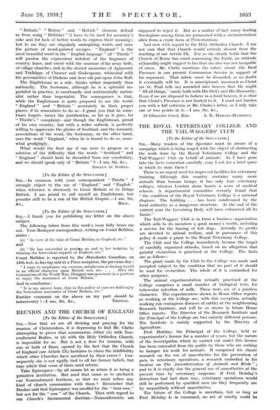REUNION AND THE CHURCH OF ENGLAND
[To the Editor of the SPECTATOR.] SIR,—Now that we are all desiring and praying for the reunion of Christendom, it is depressing to find Mr. Clarke attempting to prove that communion, either (1) with Non- conformist Bodies, or (2) with the Holy Orthodox Church, is impossible for us. But is not a door for reunion, with one or both of them, opened by the fact that the Church of England (see Article IX) hesitates to claim the infallibility which other Churches have sacrificed by their errors ? Con- sequently she is not rigidly tied to all her former beliefs, but may admit that some of them need reform. Take Episcopacy—by all means let us retain it as being a primitive institution. But need that cause us to unchurch our Nonconformist brethren, so that we must refuse any kind of church communion with them ? Remember that Hooker said that Episcopacy was needful for the " bene ease," but not for the " esse " of the Church. Then with regard to our Church's Sacramental doctrine—Nonconformists are supposed to reject it. But as a matter of fact many leading theologians among them are permeated with a sacramentalism alien from a crude form of Protestantism.
And now with regard to the Holy Orthodox Church—I am not sure that that Church would entirely dissent from the teaching of our Article IX. For as she clearly holds that the Church of Rome has erred concerning the Faith, an attitude of humility might suggest to her that she also was not incapable of error. Mr. Clarke mentions the rubric about the Real Presence in our present Communion Service in support of his argument. That rubric must be discarded, as no doubt it eventually will be. It is unscriptural, inasmuch as Christ (as St. Paul tells us) ascended into heaven that He might "fill all things," surely both with His Deity and His Humanity. Even if we are disposed to believe in a local heaven, it is clear that Christ's Presence is not limited to it. I must not burden you with a full criticism or Mr. Clarke's letter, so I only take one or two points in it.--I am, Sir, &c.,


















































 Previous page
Previous page